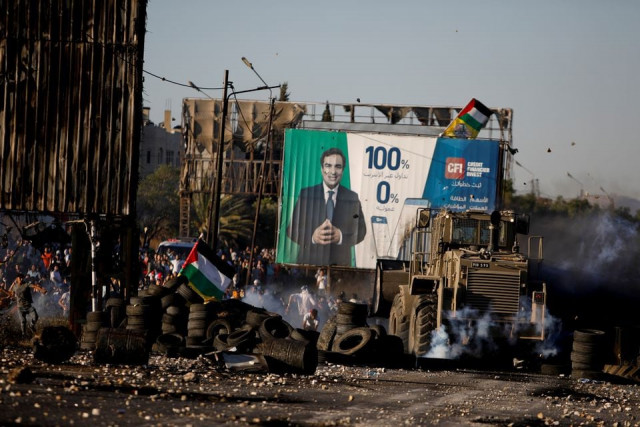Renewed violence over Gaza despite ceasefire moves gaining momentum
Any ceasefire is unlikely to address the fundamental issues in the conflict

Diplomatic moves towards a ceasefire in the Israeli-Palestinian conflict gathered pace on Thursday after U.S. President Joe Biden called for a de-escalation, but Israel kept up its bombardment of Gaza and Hamas rocket fire resumed after a pause.
A senior official in the Hamas militant group predicted a ceasefire within days. An Israeli minister said Israel would halt its offensive only when it had achieved its goals.
Rocket attacks on Israel stopped for eight hours on Thursday - the 11th day of hostilities - before resuming against communities near the Israel-Gaza border.
Israel kept up its air strikes in Hamas-run Gaza, saying it wanted to deter the Islamist group from future confrontation after the current conflict halted.
Since the fighting began on May 10, health officials in Gaza say 228 Palestinians have been killed in aerial bombardments that have worsened an already dire humanitarian situation.
Israeli authorities put the death toll to date at 12 in Israel, where repeated rocket attacks have caused panic and sent people rushing into shelters.
Biden on Wednesday urged Israeli Prime Minister Benjamin Netanyahu to seek a "de-escalation". An Egyptian security source said the sides had agreed in principle to a ceasefire but details needed to be worked out.
A Hamas political official, Moussa Abu Marzouk, said he believed the efforts to reach a ceasefire would succeed.
"I expect a ceasefire to be reached within a day or two, and the ceasefire will be on the basis of mutual agreement."
Asked on Israel's Kan public radio if a truce would begin on Friday, Intelligence Minister Eli Cohen said: "No. We are definitely seeing very significant international pressure... we will finish the operation when we decide we have attained our goals."
Qatar-based Al Jazeera television reported that U.N. Middle East peace envoy Tor Wennesland was meeting Hamas chief Ismail Haniyeh in Qatar.
Israel carried out over a dozen air strikes on Gaza after midnight, targeting what it said was a weapons storage unit in the home of a Hamas official, and military infrastructure in the homes of other commanders from the group.
Hamas-run radio said a woman was killed and four children were wounded in one attack on the town of Khan Younis in southern Gaza. Witnesses said several main roads were also damaged in the air strikes.
Relentless Gaza blitz fails to move UNSC
In the Gaza City suburb of Sabra, Amira Esleem, 14, and three family members were wounded in one Israeli attack, which she said caused parts of their house to collapse.
"We were sitting on the sofa when a missile landed. There was heavy smoke and we couldn't see anything," she said from her hospital bed.
Nearly 450 buildings in Gaza have been destroyed or badly damaged, including six hospitals and nine primary care health centres, the United Nations humanitarian agency has said. More than 52,000 people have fled their homes and most are sheltering in U.N.-run schools in Gaza, which is blockaded by Israel and Egypt.
Israelis living in areas frequently targeted by rocket fire began their workday on Thursday without the usual sound of warning sirens. But after an eight-hour break, the sirens blared again in southern Israel. No casualties or damage were reported.
Israel said some 4,000 rockets have been launched at it from Gaza, some falling short and others shot down by its Iron Dome air defences.
DIPLOMACY
Washington and several Middle East governments have sought an end to the violence through diplomacy. The United Nations General Assembly was due to meet on the conflict on Thursday with several foreign ministers taking part, but it was not expected to take action.
The U.S. mission said it would not support a French call for a resolution in the 15-member U.N. Security Council, saying it believed such actions would undermine efforts to de-escalate violence.
Commenting on Biden's push to lower the intensity of fighting in a movement towards a ceasefire, Gilad Erdan, Israel's ambassador to the United States and the United Nations, said Israel also wanted to see hostilities end quickly.
But, he told Kan radio, "for this to happen ... we have to feel that Hamas infrastructure has been hit significantly, and that it understands that it won't be worth it to fire rockets again at Israeli citizens several weeks from now."
Any ceasefire is unlikely to address the fundamental issues in the conflict. Palestinian aspirations for an independent state free of Israeli occupation have received several setbacks in recent years, while an international peace process based on finding a two-state solution which also guarantees Israel's security has run aground.
Hamas began firing rockets on May 10 in retaliation for what it called Israeli rights abuses against Palestinians in Jerusalem during the Muslim holy month of Ramadan.
The rocket attacks followed Israeli police clashes with worshippers at al-Aqsa Mosque in Jerusalem and efforts by Israeli settlers to evict Palestinians from a neighbourhood in Israeli-annexed East Jerusalem.
The hostilities are the most serious between Hamas and Israel in years, and, in a departure from previous Gaza conflicts, have helped fuel street violence in Israeli cities between Jews and Arabs.
The conflict has also stoked violence in the occupied West Bank, where Palestinian officials said at least 21 Palestinians have been killed in clashes with Israeli troops or other incidents since May 10.



















COMMENTS
Comments are moderated and generally will be posted if they are on-topic and not abusive.
For more information, please see our Comments FAQ